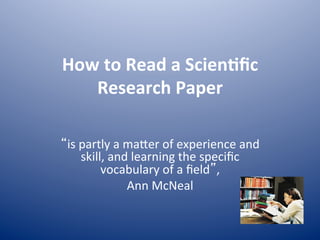How to read a scientific paper
•
1 gostou•243 visualizações
This document provides guidance on how to effectively read and understand a scientific research paper. It recommends first reading the abstract to understand the main points, then reviewing any background knowledge needed. When reading the full paper, the document advises skimming first for an overview, then carefully reading while underlining unfamiliar vocabulary. It suggests comprehending each section by considering the research problem, methods, results, and conclusions. The goal is to understand, critically evaluate, and summarize the paper's essential information and findings.
Denunciar
Compartilhar
Denunciar
Compartilhar
Baixar para ler offline

Recomendados
Recomendados
Mais conteúdo relacionado
Mais procurados
Mais procurados (20)
Best Tips On How To Write An Introduction In A Research Paper

Best Tips On How To Write An Introduction In A Research Paper
Characteristics of an effective title in a research study

Characteristics of an effective title in a research study
Mixed methods meta analyses planning your intervention

Mixed methods meta analyses planning your intervention
How to Choose a PhD Dissertation Topic For Economic Research? List out the Cr...

How to Choose a PhD Dissertation Topic For Economic Research? List out the Cr...
How to write a Scientific research paper - my point of view 

How to write a Scientific research paper - my point of view
How to Identify the Research Gap While Writing a PhD Dissertation Literature ...

How to Identify the Research Gap While Writing a PhD Dissertation Literature ...
Semelhante a How to read a scientific paper
Semelhante a How to read a scientific paper (20)
CL7 Selection of Journals Module 4 RPE-Rijo TKMCE.pdf

CL7 Selection of Journals Module 4 RPE-Rijo TKMCE.pdf
Part_A_How_to_Read_a_Scientific_Paper_2018_12.pptx

Part_A_How_to_Read_a_Scientific_Paper_2018_12.pptx
Mais de Ingrid Meléndez Nieves
Mais de Ingrid Meléndez Nieves (12)
Paraphrasing and avoiding plagiarism workshop sept 2014

Paraphrasing and avoiding plagiarism workshop sept 2014
How to read a scientific paper
- 1. How to Read a Scien.fic Research Paper “is partly a ma+er of experience and skill, and learning the specific vocabulary of a field”, Ann McNeal
- 2. Some Ques@ons to Think When Reading a Scien@fic Paper • What is the research problem that the author is trying to solve? • What is the author's trying to convince you of? • Does the author indicate how the work should be followed up on? • Does the paper generate new ideas
- 3. Parts of Scien@fic Paper • Abstract • Introduc@on • Materials and Methods • Results • Discussion • References
- 4. Preliminary Work • First read the Abstract in order to understand the major points of the work. • Review in your mind what you know about the topic – clarify if you know enough background to appreciate the paper – if not, read some background in a review paper or textbook
- 5. Steps to Read the Paper 1. Skimming – Skim the paper quickly – Note basics like: headings and figures • This takes just a few minutes. – You're not trying to understand it yet, but just get an overview.
- 6. Steps to Read the Paper 2. Vocabulary. – Go through the paper word by word and line by line. • Underline or highlight every word and phrase you don't understand • Don't worry if there are a lot of underlining's; you're s@ll trying to make sense of the ar@cle. – Look up simple words and phrases. • A medical or biological dic@onary could be useful – Get an understanding from the context in which it is used – Mark phrases that belong to one of the major concepts of the paper
- 7. Steps to Read the Paper 3. Comprehension -‐sec.on by sec.on • Introduc.on – What is the overall purpose of the research? – How does the research fit into the context of its field? Is it, for example, a+emp@ng to se+le a controversy? show the validity of a new technique? open up a new field of inquiry? – Do you agree with the author's ra@onale for studying the ques@on in this way?
- 8. Steps to Read the Paper 3. Comprehension -‐sec.on by sec.on Methods – Were the measurements appropriate for the ques@ons the researcher was approaching? – Were the measures in this research clearly related to the variables in which the researchers (or you) were interested? – If human subjects were studied, do they fairly represent the popula@ons under study?
- 9. Steps to Read the Paper 3. Comprehension -‐sec.on by sec.on Results – What is the most important finding? – Were enough data presented so that you feel you can judge for yourself the result? – Did you see pa+erns or trends in the data that the author did not men@on? – Were there problems that were not addressed?
- 10. Steps to Read the Paper 3. Comprehension -‐ sec.on by sec.on Discussion – Do you agree with the conclusions drawn from the data? – Are these conclusions over-‐generalized or appropriately careful? – Are there other factors that could have influenced, or accounted for, the results? – What further experiments would you think of, to con@nue the research or to answer remaining ques@ons?
- 11. Steps to Read the Paper 4. Reflec.on and cri.cism – Now you can understand the ar@cle and summarize it – Draw your own conclusions
- 12. References • http://www.lib.purdue.edu/phys/inst/ scipaper.html • http://classweb.gmu.edu/biologyresources/ writingguide/ScientificPaper.htm • http://www.biochem.arizona.edu/classes/ bioc568/papers.htm • http://hampshire.edu/~apmNS/design/ RESOURCES/HOW_READ.html
